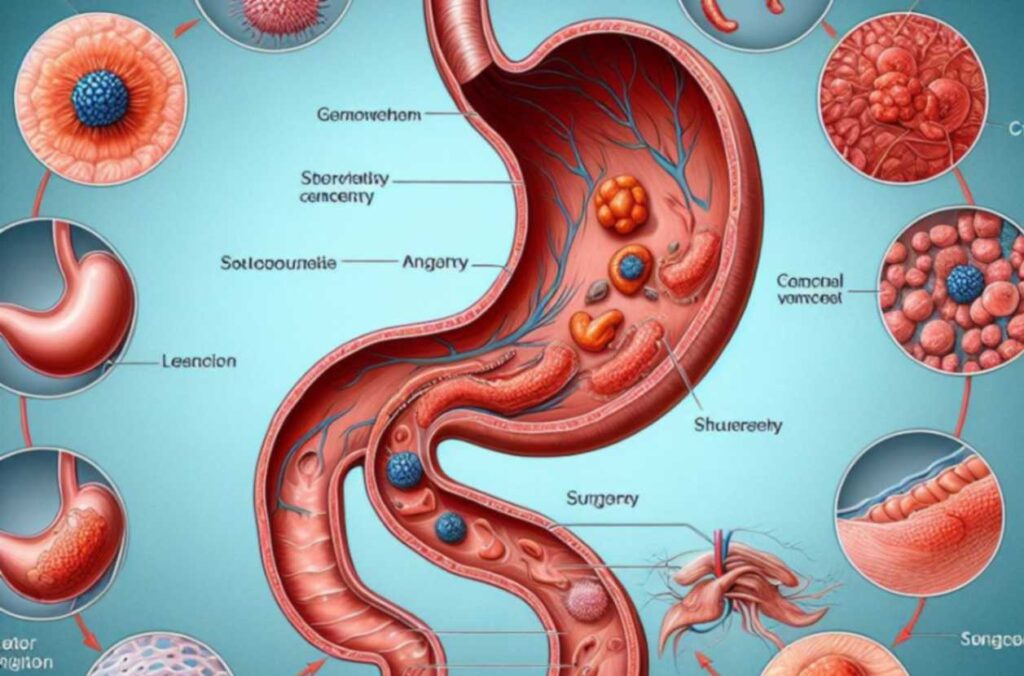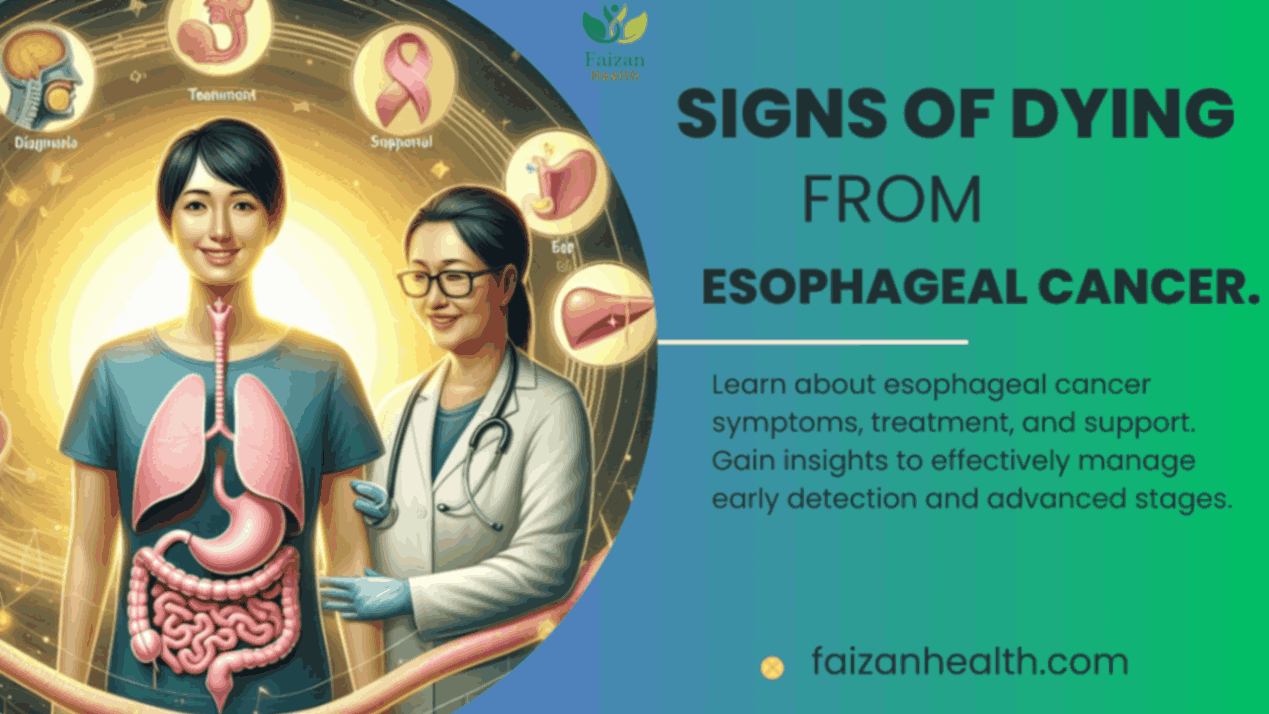Esophageal cancer is a formidable opponent, often presenting challenges in its diagnosis and treatment. With symptoms often remaining subtle until advanced stages, understanding the nuances becomes critical. We discuss esophageal cancer problems in this post, covering everything from early signs to end-of-life issues. We hope to provide you with the knowledge necessary to successfully navigate this challenging terrain by outlining its symptoms, available therapies, and palliative care alternatives. Come along as we examine the experience of esophageal cancer, providing information to enable wise choices and empathetic assistance.
1. Coping with end-of-life symptoms:
Inconvenient symptoms can have a significant negative influence on an esophageal cancer patient’s quality of life, especially when the disease is further advanced. People may experience distressing symptoms as their illness progresses, which call for palliative care and cautious management. We’ll look at coping mechanisms in this part for esophageal cancer-related end-of-life symptoms.

Understanding end-stage symptoms:
As the disease progresses, esophageal cancer frequently exhibits unsettling signs. Severe pain, dysphagia, anorexia, exhaustion, and gastrointestinal issues like nausea and vomiting are some associated symptoms. Further consequences, such as liver or lung metastases, which result in additional symptoms like,
- Jaundice.
- Shortness of breath.
- Bone pain
Can also arise from cancer spreading to other organs.
Treatment options for end-stage symptoms:
Symptom management for end-stage esophageal cancer necessitates a multimodal strategy focused on enhancing quality of life and promoting patient comfort. Various mediations and treatments may be recommended by clinical experts to further develop prosperity and decrease side effects.
Esophageal Dilation:
Stretching the esophagus widens the area that the tumor has narrowed throughout this treatment. A patient’s general comfort and nutritional status can be enhanced by esophageal dilatation by enhancing food intake and alleviating swallowing issues.
Laser ablation:
By to use concentrated laser energy, laser removal treatment kills esophageal disease cells. Through exact focusing of the growth, laser removal can lessen its size and reduce related side effects, including agony and dysphagia.
Placement of a feeding tube:
If swallowing is severely difficult or impossible due to a tumor, medical professionals may recommend the insertion of a feeding tube. A taking care of cylinder guarantees that a patient gets the supplements they require, even notwithstanding trouble gulping, by permitting nourishment and liquids to be straightforwardly controlled into the stomach or small digestive tract.

Radiation therapy and chemotherapy:
Palliative care practitioners can employ these therapies to lessen symptoms and delay the course of the illness. They can decrease growth size, ease distress, and upgrade personal satisfaction, yet they can’t fix progressed phases of esophageal disease.
Pain management:
Patients with cutting-edge esophageal disease require viable agony treatment. To reduce the agony and inconvenience brought on by the ailment, clinical experts might prescribe narcotics, nonsteroidal calming medications (NSAIDs), or related drugs.
Relieves pain and discomfort:
In addition to medical measures, end-of-life care for patients with advanced esophageal cancer must address the emotional and psychosocial elements of the disease. Patients and their families might benefit from some intervention to explore this troublesome period with pride and solace by getting comprehensive treatment, empathetic correspondence, and supporting help.
By combining medical treatment with supportive care measures, health care providers can help patients with advanced esophageal cancer effectively manage end-of-life symptoms. Treatment plans must be tailored to the patient’s individual needs and preferences, ensuring a holistic approach that prioritizes comfort, symptom management and quality of life.
2. Signs of dying from esophageal cancer:
Patients with esophageal cancer and their loved ones frequently have to confront the grim fact that they may not live long. It is essential to identify symptoms of late-stage disease in order to provide the right assistance and care. This section will discuss the signs that a patient with esophageal cancer is approaching the end of their life as well as the pain and discomfort relief options available at this point.
Recognizing end-of-life signs:
There are several symptoms that a patient with advanced esophageal cancer may be going through. These symptoms may vary depending on the patient’s condition and the course of the sickness, however they may include:
- Decreased physical function: Patients may experience a significant decrease in physical abilities, such as mobility and self-care tasks.
- Increased fatigue: Weariness and shortcoming might turn out to be more articulated as the sickness advances, diminishing energy levels and expanding the requirement for rest.
- Changes in mental status: Patients may exhibit changes in mental clarity and awareness, such as confusion or delirium, as the body weakens.
- Loss of appetite and fluid intake: In late stages of esophageal cancer, loss of appetite and interest in food and water are typical.
- Breathing changes: Breathing patterns may change, with patients experiencing irregular or labored breathing, often called Cheyne-Stokes respiration.
- Pain and discomfort: Patients might encounter expanded torment and distress, which might require forceful agony in board mediations.
Pain relief and palliative care:
Sufficient pain control and palliative care are essential for the comfort and dignity of patients with advanced esophageal cancer who are approaching the end of their lives. During this trying period, clinical experts can work on personal satisfaction and diminish torment and enduring by utilizing a scope of treatments and intercessions.

- Feeding tube for comfort: A taking care of cylinder can be embedded to supply sustenance and hydration while oral taking care of becomes troublesome or unimaginable, ensuring the patient’s solace and enough sustenance.
- Esophageal Dilation for Relief: Procedures for esophageal dilatation can help patients swallow more easily and eat and drink more comfortably, improving their quality of life.
- Laser ablation for symptom control: Laser removal treatment can be utilized to target and psychologist the size of the growth, alleviating side effects, for example, agony and trouble gulping.
- Radiation and chemotherapy for palliation: To aid in tumor reduction, pain management, and general comfort, radiation and chemotherapy may be used.
- Pain management with medications: In end-of-life care, pain control effectiveness is crucial. In order to guarantee the comfort and wellbeing of their patients, medical professionals may recommend opioids, other drugs, and other pain management techniques.
Doctors treat esophageal disease side effects and give full palliative consideration to assist patients and their families with traversing this troublesome time with nobility, empathy, and solace. prepared to Zeroing in on the cravings and tendencies of the patient is major while areas of strength for passing that is specially crafted on to their particular requirements and conditions.
Conclusion:
In conclusion, managing the side effects of esophageal cancer necessitates a multimodal strategy that involves prompt diagnosis, thorough treatment, and kind end-of-life care. We have gone over each stage of the disease’s symptoms, treatment choices, and management techniques throughout this page. We can work to enhance outcomes and raise the quality of life for esophageal cancer patients and their Caregivers by providing information and services to them.

As we move forward, let us continue to advocate for research, raise awareness, and foster a community of support, ensuring that no one faces this difficult journey alone. Together, we can make a meaningful difference in the lives of those affected by esophageal cancer, offering hope, dignity and comfort every step of the way.
Read More About Hypermobility Spectrum Disorder.
FAQs:
What are the early signs of esophageal cancer?
Early symptoms of esophageal cancer may include difficulty swallowing, persistent indigestion or heartburn, unexplained weight loss, and chest pain or discomfort.
What treatments are available for advanced esophageal cancer?
Treatment for advanced esophageal cancer may include chemotherapy, radiation therapy, targeted therapy, immunotherapy, palliative care, and in selected cases, surgery. Treatment decisions are based on factors such as the stage of the cancer, the patient’s overall health, and individual preferences.


Your point of view caught my eye and was very interesting. Thanks. I have a question for you.
I pay a quick visit each day a few sites and sites to read
articles or reviews, but this weblog offers quality based posts. https://zeleniymis.com.ua/
I pay a quick visit each day a few sites and sites to read articles or reviews, but this weblog
offers quality based posts. https://zeleniymis.com.ua/
Hello! Do you know if they make any plugins to help with SEO?
I’m trying to get my site to rank for some targeted keywords but I’m not
seeing very good success. If you know of any please share. Kudos!
You can read similar blog here: Bij nl